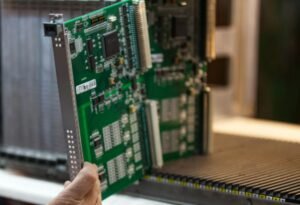What Is AI Today?
Artificial Intelligence (AI) has become an increasingly integral part of our lives, impacting various sectors and industries. From virtual voice assistants to self-driving cars, AI has revolutionized how we live and work. Let’s explore what AI is, its current applications, and its implications for the future.
Key Takeaways:
- AI is a branch of computer science that aims to create intelligent machines capable of performing tasks that typically require human intelligence.
- AI is being applied in diverse areas, including healthcare, finance, entertainment, and transportation.
- The successful development of AI relies on advancements in machine learning, natural language processing, and computer vision.
Understanding AI:
Artificial Intelligence refers to the simulation of human intelligence in machines that can learn, reason, and make decisions. It encompasses various subfields, such as machine learning, natural language processing, and computer vision. *AI systems can analyze vast amounts of data and identify patterns that humans may not easily recognize.
The Current State of AI:
Presently, AI is being utilized in numerous domains, driving innovation and enhancing efficiency. *AI algorithms power personalized recommendations on streaming platforms like Netflix and Spotify, improving user experiences.
Here are some notable AI applications:
- AI-powered virtual assistants like Apple’s Siri and Amazon’s Alexa have become household names, helping users with tasks and providing information.
- AI is used in healthcare to diagnose diseases, create treatment plans, and assist with surgical procedures.
- Financial institutions employ AI algorithms to detect fraudulent activities and optimize trading strategies.
- Self-driving cars rely on AI to navigate roads, interpret traffic signs, and avoid collisions.
The Impact and Potential:
AI has already transformed several industries and has the potential to revolutionize many more. The widespread adoption of AI can lead to:
- Increased productivity and efficiency in various sectors.
- Improved healthcare outcomes through personalized treatments and diagnostics.
- Enhanced user experiences through customized recommendations and tailored services.
- Automation of repetitive and mundane tasks, freeing up human resources for more complex and creative work.
Current AI Landscape:
| Country | Number of AI Startups |
|---|---|
| United States | 2,498 |
| China | 1,074 |
| United Kingdom | 624 |
Challenges and Ethical Considerations:
While AI offers tremendous potential benefits, it also presents challenges and ethical concerns that must be addressed. For instance, the impact on employment, data privacy, and bias in AI algorithms are areas that require careful consideration and regulation.
The Future of AI:
The road ahead for AI is promising. Technological advancements, coupled with increased investment and research, will lead to more powerful and sophisticated AI systems. *Imagine a future where AI helps us solve complex problems, cure diseases, and create a sustainable world.
References:
- “Artificial Intelligence”, Stanford Encyclopedia of Philosophy
- “Artificial Intelligence: The Next Digital Frontier?”, McKinsey Global Institute

Common Misconceptions
Definition of AI
One common misconception people have about AI today is that it refers to humanoid robots, like those depicted in science fiction movies. However, AI is not limited to physical robots. AI refers to the development of computer systems that can perform tasks that would normally require human intelligence, such as speech recognition, problem-solving, and decision making.
- AI is not limited to physical robots
- AI encompasses a wide range of computer systems and algorithms
- AI enables tasks that mimic human intelligence
Limits of AI
Another misconception is that AI is infallible and can perform any task better than humans. However, AI systems have their limits. While they excel in certain areas, such as analyzing large amounts of data or recognizing patterns, they lack common sense and contextual understanding that humans possess. Additionally, AI can only perform tasks it has been trained or programmed for, and cannot go beyond that scope.
- AI has limitations and cannot replace human intelligence in all areas
- AI lacks common sense and contextual understanding
- AI can only perform tasks it has been trained or programmed for
The Impact of AI on Jobs
One prevalent misconception is that AI will completely replace human jobs. While it is true that AI can automate certain tasks, it also has the potential to create new jobs and enhance the capabilities of human workers. Rather than causing wholesale job loss, AI is more likely to change the nature of work, with humans and AI systems working together in collaboration to achieve better outcomes.
- AI can create new jobs and enhance human capabilities
- AI is more likely to change the nature of work rather than causing job loss
- Humans and AI systems can work together in collaboration
AI as an All-Knowing System
There is a misconception that AI systems have access to unlimited knowledge and are all-knowing. However, AI systems are only as good as the data they have been trained on. They can make mistakes and biases can be introduced based on the training data. Additionally, AI systems require continuous learning and updates to keep up with new information and evolving circumstances.
- AI systems are not all-knowing and can make mistakes
- Biases can be introduced based on the training data
- AI systems require continuous learning and updates
AI as a Threat to Humanity
One common misconception about AI is that it poses an existential threat to humanity. While AI ethics and governance are important considerations, the portrayal of AI as an imminent threat capable of taking over the world is often exaggerated in popular culture. It is crucial to approach AI development in a responsible and ethical manner, but the development and implementation of strong safeguards can mitigate any potential risks.
- AI ethics and governance are crucial but the threat to humanity is often exaggerated
- Responsible and ethical development of AI is important
- Strong safeguards can mitigate potential risks

AI Adoption in Industries
AI is being rapidly adopted across various industries, revolutionizing the way businesses operate. The table below provides a glimpse of AI implementation in different sectors.
| Industry | AI Applications | Benefits |
|---|---|---|
| Healthcare | AI-assisted diagnostics, robotic surgery | Improved accuracy, faster treatment |
| Finance | Fraud detection, algorithmic trading | Enhanced security, efficient trading |
| Transportation | Self-driving cars, route optimization | Reduced accidents, optimized logistics |
| Retail | Personalized recommendations, chatbots | Increased sales, enhanced customer experience |
AI-Powered Personal Assistants
AI-powered personal assistants have become an integral part of our lives, helping with tasks and providing valuable information. The table showcases popular personal assistants and their unique features.
| Personal Assistant | Features |
|---|---|
| Alexa | Voice commands, smart home control |
| Siri | Speech recognition, seamless device integration |
| Google Assistant | Contextual understanding, wide range of apps |
| Cortana | Productivity integration, personalized recommendations |
AI in Entertainment
AI has made significant advancements in the entertainment sector, enhancing user experiences. The table below highlights how AI is shaping various aspects of entertainment.
| Domain | AI Applications |
|---|---|
| Music | AI-generated songs, personalized playlists |
| Gaming | Intelligent NPCs, adaptive gameplay |
| Movies | Visual effects, AI-assisted editing |
| Virtual Reality | Immersive experiences, realistic simulations |
AI Ethics Considerations
The increasing role of AI in society raises important ethical considerations. The table provides some key ethical considerations surrounding AI implementation.
| Consideration | Explanation |
|---|---|
| Privacy | Protecting sensitive data and user privacy |
| Discrimination | Avoiding biased decisions and mitigating unfairness |
| Transparency | Ensuring AI systems are explainable and understandable |
| Accountability | Assigning responsibility for AI-generated actions |
AI and Job Market
AI’s impact on the job market is a topic of much debate. The table below showcases the effect of AI in different job sectors.
| Job Sector | Effects of AI |
|---|---|
| Manufacturing | Automation of repetitive tasks, job displacement |
| Customer Service | Chatbot assistance, reduced demand for human agents |
| Education | AI tutors, personalized learning experiences |
| Finance | Automated financial analysis, reduced need for analysts |
AI Research Breakthroughs
AI research continues to push boundaries, leading to groundbreaking discoveries. The table showcases recent remarkable AI research breakthroughs.
| Breakthrough | Description |
|---|---|
| AlphaGo | Defeated world champion Go player using deep reinforcement learning |
| OpenAI’s GPT-3 | Largest language model with 175 billion parameters |
| DeepMind’s AlphaFold | Predicted the 3D structure of proteins with remarkable accuracy |
| IBM’s Project Debater | Engaged in debates with human opponents using natural language processing |
AI and Climate Change
AI technology is also being leveraged to address climate change challenges. The table showcases AI applications in combating climate change.
| Application | Role of AI |
|---|---|
| Renewable Energy | Optimizing energy production and grid management |
| Climate Modeling | Improving climate prediction and simulation accuracy |
| Agriculture | Enhancing crop yield predictions and precision farming |
| Smart Cities | Optimizing energy consumption and waste management |
AI and Healthcare
The field of healthcare has witnessed remarkable AI advancements, contributing to significant improvements. The table highlights AI’s impact on healthcare.
| Application | AI Contribution |
|---|---|
| Medical Imaging | Accurate diagnosis and early detection |
| Drug Discovery | Accelerated identification of potential compounds |
| Virtual Assistants | Improved patient interactions and appointment scheduling |
| Chronic Disease Management | Personalized treatment plans and monitoring |
AI and Cybersecurity
AI is playing a crucial role in strengthening cybersecurity measures. The table showcases AI applications in combating cyber threats.
| Application | AI Utilization |
|---|---|
| Threat Detection | Anomaly detection and behavioral analysis |
| Phishing Prevention | Email analysis and link verification |
| Vulnerability Assessment | Automated identification of system weaknesses |
| Incident Response | Real-time threat mitigation and response |
In conclusion, AI has permeated various industries, impacting everything from personal assistants to entertainment, healthcare to climate change. With ongoing research breakthroughs and ethical considerations, AI is sure to continue shaping our world, presenting limitless possibilities for the future.
Frequently Asked Questions
What is AI?
What does AI stand for?
How does AI work?
What are the main components of AI?
What are some examples of AI applications?
How is AI used in healthcare?
What are some other AI applications?
What are the benefits and challenges of AI?
What are the benefits of AI?
What are the challenges of AI?
What is the future of AI?
How will AI impact different industries?
Will AI replace humans in the workforce?




